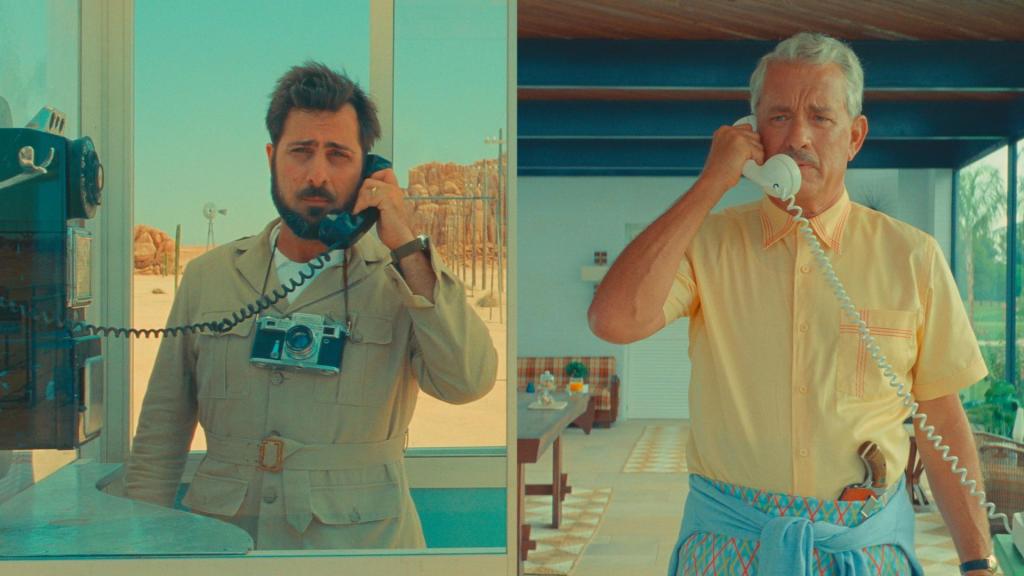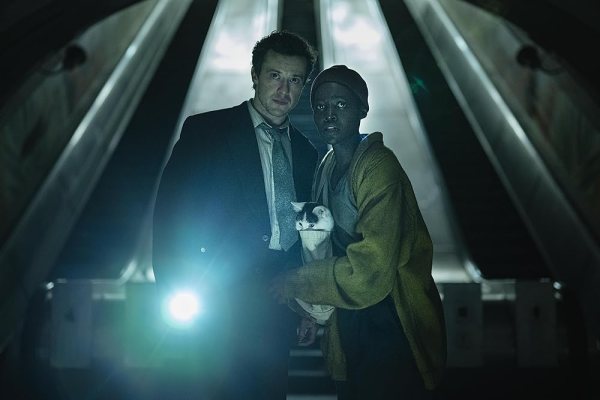Editor’s note: This article includes spoilers.
The characters in Asteroid City lose their faith in God. That’s not a surprising outcome for a movie made in a rapidly secularizing era. What’s unexpected is that the film also doubts an uncompromising, materialistic atheism.
Like many of his previous films, Wes Anderson’s latest is a narrative and visual nesting doll, a story within a story within a story. Asteroid City, the movie, begins with a TV host (Bryan Cranston) narrating the opening of a 1950s variety show about the making of a play of the same name, which refers to a fictional desert town in the American Southwest where an asteroid once crashed—leaving behind small remains—and where most of the film’s action takes place.
On the side of the road, next to an unfinished highway ramp, war photographer Augie Steenbeck (Jason Schwartzman) arrives at Asteroid City with his teenage son and three younger daughters. His son Woodrow (Jake Ryan) is set to participate in the Junior Stargazer convention, a program hosted by the U.S. Army for young “brainiacs” to present inventions and observe astrological phenomena. After a cryptic phone call with his father-in-law (Tom Hanks), Augie breaks terrible news to his children: Their mother has died. “Let’s say she’s in heaven,” he tells them, “Which doesn’t exist for me, of course. But you’re Episcopalian.”
Amid this familial turmoil, a surprise intergalactic visitor descends on Asteroid City. During a rare planetary alignment being observed by the junior stargazers and their families, a UFO appears in the night sky and drops an alien on the confused onlookers. The alien steals the town’s asteroid before being whisked away by the flying saucer. In response, the Army quickly quarantines Asteroid City to keep the news from getting out.
Asteroid City is deeply concerned with secrets and the unknown: an inconspicuous family death, a confidential close encounter. While characters in the film try to keep them under wraps, these secrets are too tangible to remain unknown. The triplets bury their mother’s ashes (contained in Tupperware). Augie takes and develops a photo of the alien. Despite efforts to the contrary, these secrets cannot remain hidden because their answers are part of the physical world.
The movie also explores a third and more significant secret—the secret of finding or forming meaning itself. Unlike the first two secrets, there are no definitive material remnants to explain the meaning of life. As a result, much of Asteroid City explores how to pursue meaning qua meaning, without tangible evidence to corroborate its existence.
In the absence of physical proof, the movie’s characters turn to religious conventions to make sense of their predicaments. A school child wonders about the alien through a modified song version of the Lord’s Prayer (“Dear alien, who art in Heaven”). Augie dreams of encountering his deceased wife (Margot Robbie) on the alien planet and describes it as heavenlike. They speculate about the heavens, and in doing so allude to the possibility that one must abandon the horizontal plane of physical existence and pursue a vertical expansion of intellectual and spiritual thought. Perhaps as Tocqueville suggested, to believe in nothing is worse than believing incorrectly, since “it is not so much that all citizens profess the true religion as that each citizen profess some religion.”
But the characters in Asteroid City largely limit themselves to a horizontal viewpoint. The alien’s visit is brief, and none of the human characters are able to engage with this seemingly transcendent being before it leaves. Even the asteroid is treated as nontranscendent material, returned by the alien with a stamped barcode, as if to catalog it for some interstellar bureaucracy.
Despite this disappointment, Asteroid City doesn’t completely abandon its meaning-making search. In one of the film’s defining moments, Schubert Green (Adrien Brody), the play’s director, tells Augie to “keep telling the story”—even if he does not understand what it all means. Humans may never fully discover the secret of meaning, but the film suggests that uncertainty should not keep us from talking about it, or from hoping and believing that we’ll find an answer to this secret in due time.
Woodrow declares himself an atheist by the end of the film. Asteroid City, however, doesn’t seem to dismiss faith in the transcendent—even the divine—as oppressive or overbearing. Instead, the film offers an opportunity to think about questions of meaning, doubt, and the inadequacy of a strictly horizontal frame of mind. It leaves open the possibility that to seek meaning, one must not only turn outward, but also upward.








Please note that we at The Dispatch hold ourselves, our work, and our commenters to a higher standard than other places on the internet. We welcome comments that foster genuine debate or discussion—including comments critical of us or our work—but responses that include ad hominem attacks on fellow Dispatch members or are intended to stoke fear and anger may be moderated.